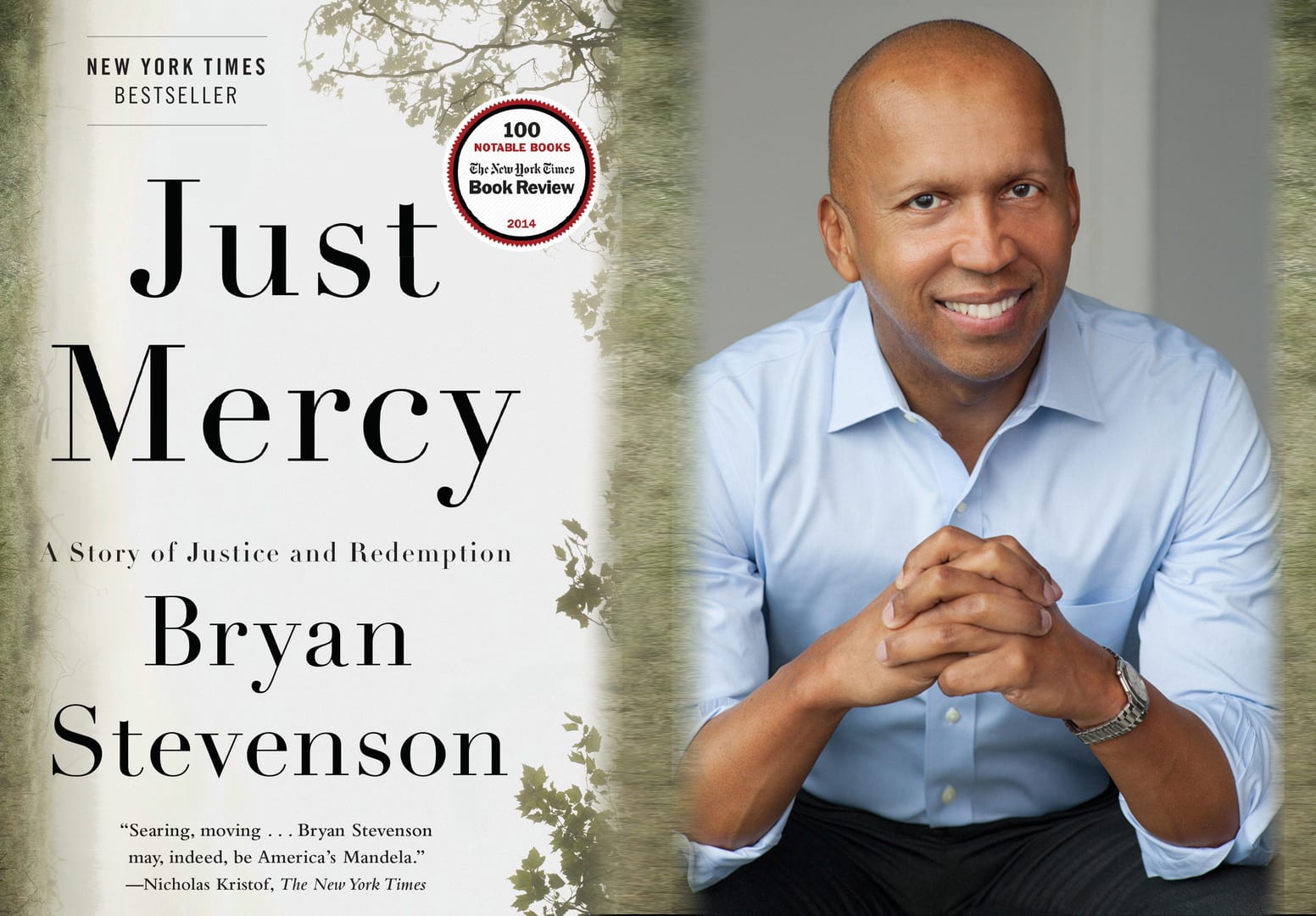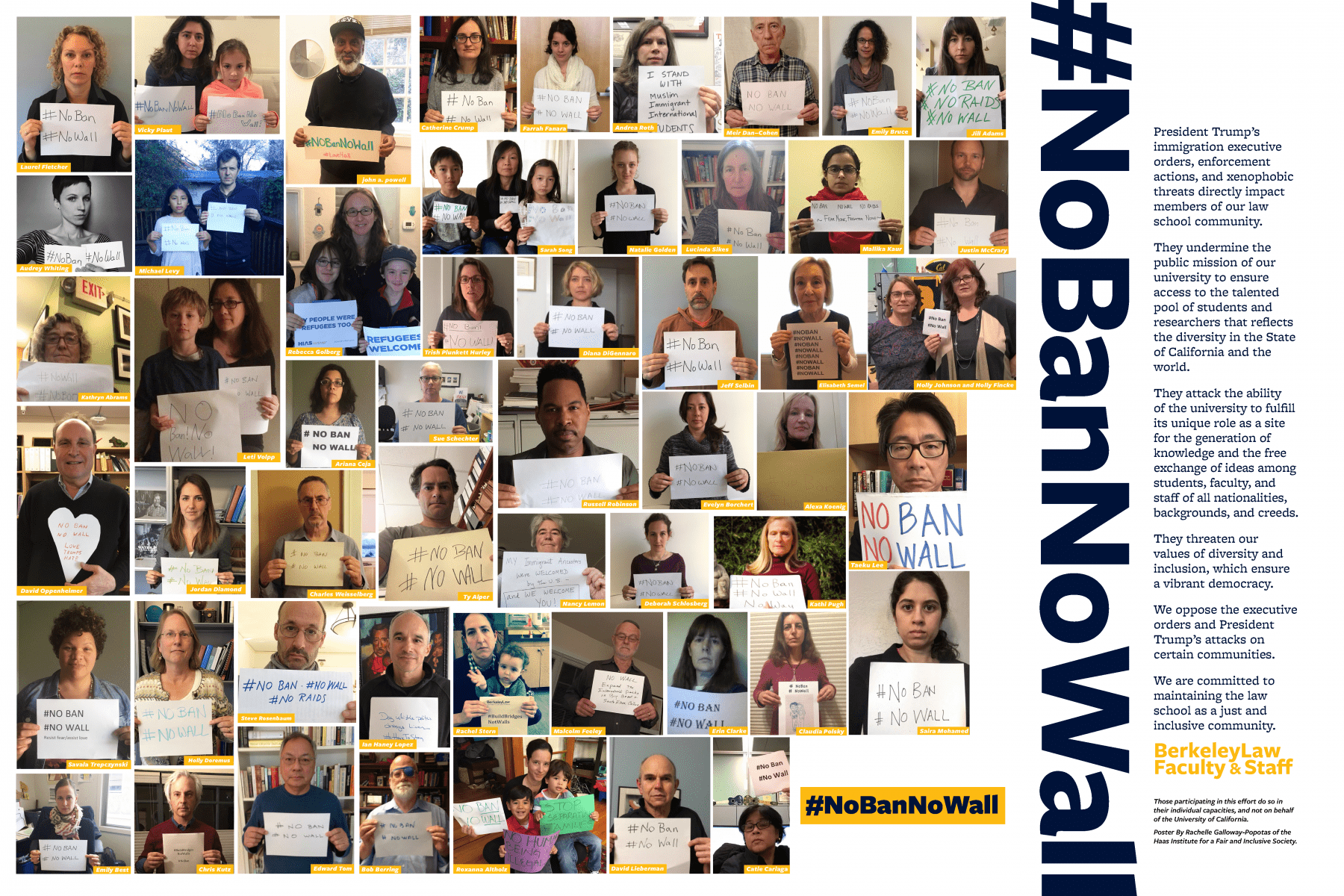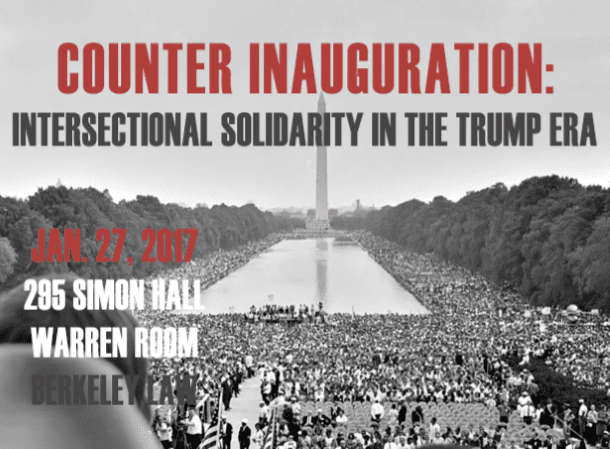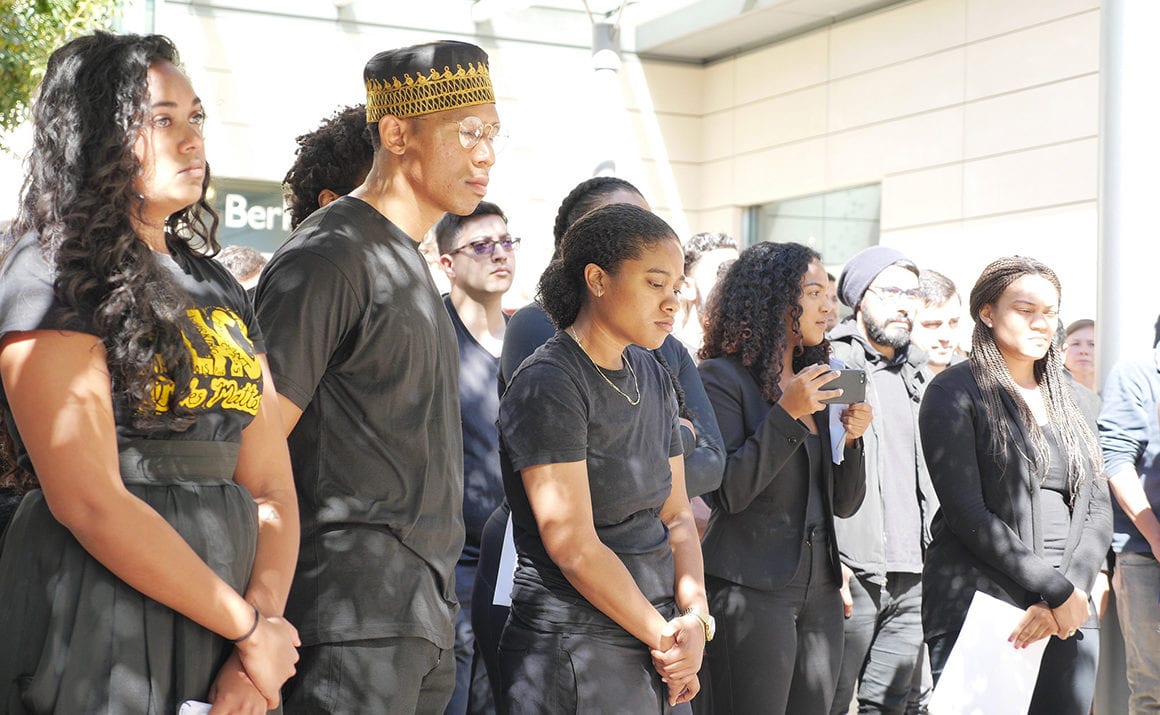
One of our roles in this community is to respond to world events with a compassionate voice that reflects our shared values. In this space, you will find some of the ways in which we have recently spoken out for justice.
THOUGHTS ON KAVANAUGH (10-3-2018)
Last week’s Senate hearing, in which Dr. Christine Blasey Ford and Judge Brett Kavanaugh testified, was disturbing for many reasons. The information it surfaced about our society has been upsetting to me and, I know, to many of you. These are times when divisions can emerge. But I want, in this note, to spend a moment thinking about an issue on which we, as members of a law school community, can find common ground no matter where we stand in the political and social debate.
James Baldwin wrote, “Ignorance, allied with power, is the most ferocious enemy justice can have.” As I watched the Kavanaugh hearings last week, I couldn’t get this phrase out of my head, and the word ignorance in particular, in the sense of unaware, or unconscious. I kept thinking, he must be totally unaware of how he sounds. He seemed to be in a free-fall, or so deeply performing righteous indignation that he’d fused himself with the character he was playing–either way, he was belittling, combative, rude, and at times, evasive.
Put differently, last Thursday, Kavanaugh seemed totally unaware, or unconscious, of lawyer’s and judges’ professional norms. True, he must have felt he was in the battle of his life. And true, our norms are sometimes aspirational and imperfect, but they are deeply important. They knit our professional community together. They give us something to rely on and against which we can measure aberrations. And–though perhaps it borders on overstatement–in a system like ours, which is built on shared ideas and a shared reality, our norms are precious glue. Without them, the seams begin to unravel. I’m thinking of simple, concrete elements of professional behavior: speaking with a civil tone, not interrupting, being forthright. I’m also thinking of more abstract things: keeping a grasp on humility as you assert power, treating coequal branches of government with respect, aspiring to comity. There is a time to subvert norms in service of social justice, but that is not at issue here.
To be sure, I’m extremely interested in understanding more about Dr. Ford’s allegations, in how the Supreme Court’s integrity will fare, and in what comes next. But these questions are complex and invite debate.
There is another more simple, and less debatable, question to consider: should lawyers and judges enter professional settings and act like Kavanaugh acted last Thursday? The answer is no, we should not. It is possible to be passionate, fiery, and tireless–to fight like hell–while still being considerate and respectful of others’ roles, rights, and humanity. Dr. Martin Luther King, for example, epitomized this approach to advocacy. It is possible to be self-aware under extreme circumstances. And it is possible to offer fellow human beings basic social decency, always.
I hope that you, dear students, see Kavanaugh’s belligerent incivility as a major breach of professional behavior, not the norm. Know that many of us reject it. We are bothered not only because of the seriousness of the allegations, but because Kavanaugh failed to behave decently and respectfully during Thursday’s hearing. As my grandmother would say, he didn’t act right.
We can act right. Let’s remind ourselves that we–as lawyers, as people–can meet a higher standard, and it’s a privilege to model this standard for each other. We attorneys have a monopoly on the levers of legal power. Let’s not ally this power with ignorance. We know better.
In Solidarity,

Savala Trepczynski
Executive Director
Thelton E. Henderson Center for Social Justice
BERKELEY LAW FACULTY AND STAFF #NOBANNOWALL STATEMENT (2-17-2017)
President Trump’s immigration executive orders, enforcement actions, and xenophobic threats directly impact members of our law school community.
They undermine the public mission of our university to ensure access to the talented pool of students and researchers that reflects the diversity in the State of California and the world.
They attack the ability of the university to fulfill its unique role as a site for the generation of knowledge and the free exchange of ideas among students, faculty, and staff of all nationalities, backgrounds, and creeds.
They threaten our values of diversity and inclusion, which ensure a vibrant democracy.
We oppose the executive orders and President Trump’s attacks on certain communities.
We are committed to maintaining the law school as a just and inclusive community.
Download the PDF of the poster.
COUNTER INAUGURATION (1-27-2017)
In response to the inauguration of Donald Trump, the Henderson Center collaborated with in-house and community experts to convene conversations about race, surveillance, gender equity, immigration, criminal law, and more in the Trump era.
“Symposium: Legal Implications of a New Administration” by Andrew Cohen (2-3-2017)
During a daylong symposium at Berkeley Law on January 27, lawyers, policy experts and scholars identified legal implications of the new presidential administration and strategies for addressing them.
Presented by the school’s Thelton E. Henderson Center for Social Justice, the event tackled issues of gender, sexual and reproductive justice; immigration; domestic surveillance; the environmental, social and governance impacts of business; race relations; and incarceration.
Center Executive Director Savala Trepczynski ’11 said Donald Trump’s campaign and initial actions as President “threaten social justice and democratic norms. The conversations at this symposium let us explore the legal and human impacts of his agenda.”
Trepczynski moderated the race panel, which she said sought to “tease out why Trump’s racialized campaign rhetoric was so effective. We wanted to give people an opportunity to sort through that question in an open, honest and low-pressure space.”
Immigration anxiety
Moderated by Professor Leti Volpp, the immigration panel described an uncertain landscape amid executive orders banning all refugees for 120 days, people from seven predominantly Muslim countries for 90 days and Syrian refugees indefinitely. Panelists also noted that before Trump became President, a record three million people were deported under Barack Obama.
Citing the recent wars in Iraq and her native Afghanistan, American Civil Liberties Union (ACLU) consultant Nasrina Bargzie ’05 asserted that the new ban on refugees “ignores our country’s role in creating these refugees. She said, “National security is not an area of law, it’s a convenient excuse.”
Linda Tam ’00, director of the East Bay Community Law Center’s Immigration Program, shared experiences from a chaotic week. “I’m getting questions I’ve never heard before,” she said. “Clients are asking, ‘How long will it take to change the laws? Is my U-Visa processing just going to stop?’ Even clients with green cards are scared. A climate of fear has been created among all immigrant communities.”
One of Tam’s clients was deported that same day. After explaining to Immigrations and Customs Enforcement (ICE) officials that a stay of removal filed on his behalf had not been reviewed, Tam said she was told, “‘This isn’t a negotiation.’” In her view, “ICE now feels emboldened. Enforcement and the scope of who can be deported is already expanding, and local law enforcement has carte blanche to act as immigration officials.”
Panelists also discussed the potential impact of the federal government defunding sanctuary cities and using voter fraud investigations to suppress minority voting.
Women’s rights
Jill Adams ’06, executive director of Berkeley Law’s Center on Reproductive Rights and Justice, moderated a panel on the rights of women and the LGBTQ community. Equal Rights Advocates senior staff attorney Jessica Stender ’09 predicted a rocky road for wage and workplace equality.
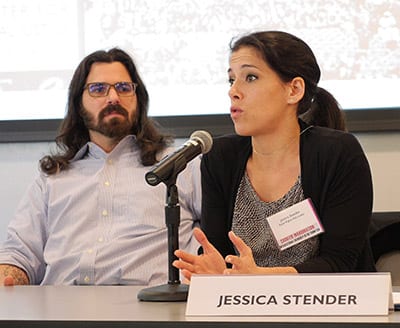
“We’re already seeing an attack in those areas, and can expect rollbacks on legal protections there,” she said. “California has a lot of strong laws on the books. … Keeping our rights strong and protecting them as a model for other states across the country is extremely important.”
California has the nation’s strongest gender equity fair pay act, Stender said, and legislators are developing two bills to expand unpaid medical leave following childbirth. One bill would increase the types of workers eligible for such medical leave; the other would lower the threshold of company employees entitled to it—from 50 or more, to 20 or more.
On the federal level, Stender expects “little to no movement” on creating more family-friendly workplaces “even though 82 percent of women now get pregnant while working.” Citing the Equal Employment Opportunity Commission (EEOC) as a barometer for women’s workplace rights, she said, “The guidance the EEOC receives from above will dictate how much it enforces. It has been focused on robust systemic change in recent years, but now will probably swing to select individual cases.”
Stender also discussed efforts to weaken Title IX, which bans discrimination on the basis of sex in any federally funded education program. She cited a push to increase the burden of proof in sexual assault cases on college campuses, which she said could continue under Trump.
Domestic surveillance
Experts on the surveillance panel predicted that privacy will become increasingly elusive. James Dempsey, executive director of the Berkeley Center for Law & Technology, said public and private sector experts agree that “this is the golden age of surveillance.”
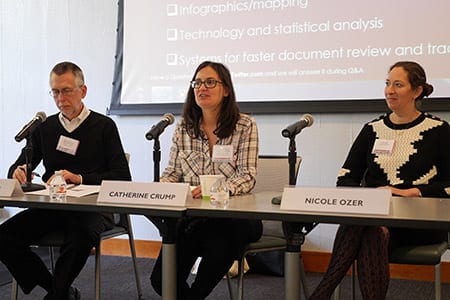
Nicole Ozer ’03, Technology and Civil Liberties Policy Director for the ACLU of Northern California, noted that federal law safeguarding electronic communications has not been updated since 1986. One of the results is “a massive surveillance infrastructure that may now be used to disproportionately target immigrants, activists and journalists,” she said.
Ozer also discussed the dramatic spike in local law enforcement’s sophisticated surveillance equipment over the past few years. “Much of it has been purchased without any local oversight because it came in with federal grant money,” she said. “We have to reveal what’s happening, because much of it is in the shadows.”
Ozer cited effective examples of publicizing such instances. When journalists revealed Oakland’s push to build a fusion center that would funnel data to the federal government’s data bank, the public outcry was so great that the center was never built. Soon after, the Oakland Privacy Commission—the nation’s first such local entity—was created. Similar efforts grounded a drone purchased by San Jose through federal funding, and stopped a social media surveillance operation by the Fresno Police Department that tracked hash tags such as #BlackLivesMatter and #TimeForChange.
Catherine Crump, acting director of the Samuelson Law, Technology & Public Policy Clinic, described myriad opportunities for Berkeley Law students to work on timely surveillance issues—and the importance of those efforts. “When California does something, the rest of the country thinks, ‘Maybe that can work here, too,” she said.
RADICAL FOR EACH OTHER RIGHT NOW (12-16-2016)
Our executive director offers readers four ways to self-radicalize and re-humanize each other after the 2016 election. (Click here for the original Berkeley Blog post.)
If certain things about President-elect Trump remain unclear — policy positions, his taxes, his ultimate vision — one thing is certain: he has peeled back the worn-out bandage on America’s most infected wounds and summoned some of humanity’s darkest impulses. How we respond to his presence may, indeed, determine not just who we include when we say “we the people,” but which people still exist here to be included.
Here is the truth: all who believe that our experiment in diversity, equity, and inclusion should continue must become radical, now. And we must become radical for each other.
This means shedding fears, silos, and inhibitions in order to be a warrior for the rights, dignity, and personhood of everyone Trump’s impending presidency imperils. If we don’t, we risk the horror that triumphs when good people do nothing. So how do we become radical for each other?
1.We learn to welcome pain. Our culture encourages us to replace pain immediately with anger, food, shopping, social media, and denial. But to be radical we must be empathetic, and to be empathetic we must be willing to bear witness to, sit with, and honor each other’s pain. Until you see and feel someone else’s suffering, their struggle will never be part of your circle of concern.
2. We commit to a fearless inventory of our own bigotry. Social science tells us that we all harbor unconscious bias. This is part of the human experience. Yet, especially in America, we are so trained to be superficially appalled by sexism, racism, and other biases that we are often unwilling to examine the bigotry in our hearts, conscious or not. This inventory, fueled by the disinfectant of self-awareness, is unpleasant. But even the most liberal among us (myself included) has an issue or two about which we secretly roll our eyes. Identify those issues and ask yourself whether you can still afford to be skeptical. Our skepticism, after all, keeps us silent. And we need each other to speak.
3. We engage our privilege. Each of us has a hand on some lever of power. I may be black, fat, and female (three identities which often lead to othering and dis-empowerment), but I am also well-educated, rich by global standards, and cisgender. I can use my particular nexus of privilege in service of others. I can use my money, my education, and my access to normative gender standards in ways that my poor, less-educated, transgender fellow citizens perhaps cannot. And my husband, who is white and male, can use his particular privileges in service of me, or our children, or you. We each must learn what our privileges are and research how to activate them in service of others.
4. We create belonging in our daily lives. Many women, people of color, immigrants, members of LGBTQI communities, poor people, religious minorities, persons living with disabilities, and more live with the untended injury of not belonging — of feeling like an “other” in one’s own country. We experience symbolic annihilation. We, as Martin Luther King wrote, “are forever fighting a denigrating sense of nobodiness.” But we can heal each other, starting with the small patches of earth on which we make and mend our daily lives. Make eye contact, speak to each other, openly ask and honestly answer the question, “How are you?” These habits transform mere members of identity groups (tall black guy, old Asian woman) into human beings. Let us do this work of rehumanizing to and for each other starting right where we live.
We will get through this chapter of history; but our condition after the “getting through” depends on what we do now. Today and tomorrow, there will be opportunities for each of us to be radical for one another. Let’s dedicate ourselves to subversive, revolutionary, game-changing inclusion and love. Now is the time.
ALICIA GARZA, BLACK LIVES MATTER CO-FOUNDER (11-7-2016)
The Henderson Center invited Black Lives Matter co-founder, celebrated activist, writer, and visionary Alicia Garza to Berkeley Law on November 7, 2016, to discuss the current state of the movement and what the next steps must be for all who believe Black Lives Matter.
Black Lives Matter co-founder Alicia Garza speaks to UC Berkeley students, article by Fionce Siow, The Daily Californian.
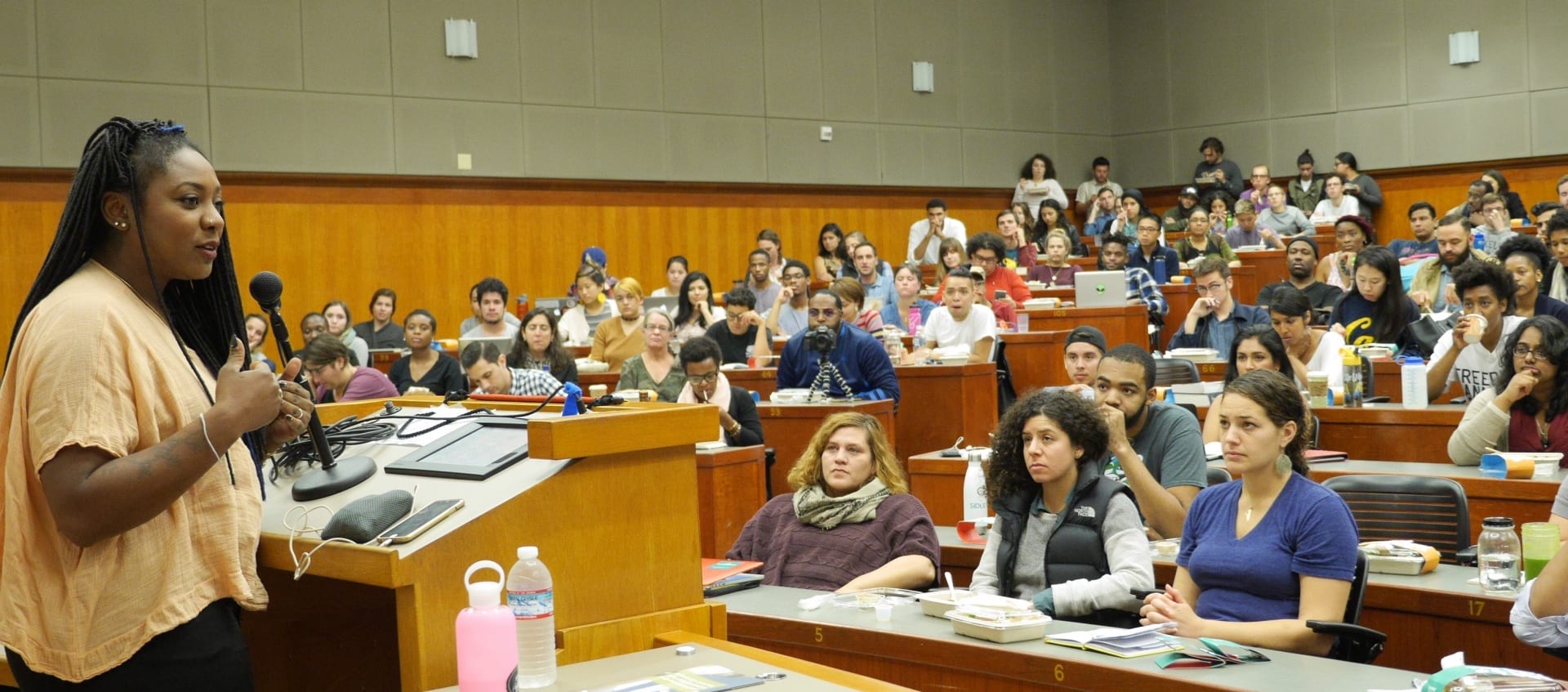
More than 200 people packed into a UC Berkeley School of Law lecture hall Monday to hear Alicia Garza, co-founder of Black Lives Matter, clarify misconceptions and speak to the history of the movement.
Garza discussed topics ranging from slavery to intersectionality for more than an hour. She was the keynote speaker in a presentation entitled “Black Lives Matter: Where Do We Go From Here?” organized through the Thelton E. Henderson Center for Social Justice.
“It’s important that students and staff and faculty learn more about this movement principally because it’s a movement that will succeed or fail depending on how many different kinds of people are engaged in the deeper, broader message of the movement,” said Savala Trepczynski, executive director of the Henderson Center.
Among numerous other points, Garza talked about dispelling the common misconception that only Black men are killed by the police, citing the struggles of Black people who are women, queer or disabled.
“We don’t have to climb over each other to try to get some justice,” Garza said during her speech. “It’s all of us or none of us, no matter what. … It doesn’t work any other way.”
Garza went on to talk about Black-on-Black violence, white privilege and intrinsic racism.
“I’m really appreciative of (Garza),” said Chicano studies major Nancy Rubio, who was in attendance and has seen Garza speak before. “I love her light spirit and … the way she’s also able to laugh throughout, take pauses and really have love for everyone, talking about whiteness and white supremacy.”
Rubio added that one of her favorite parts of the presentation was Garza’s point that the movement is not an appeal to white sensibility but a project for Black people to rehumanize themselves.
Garza wrapped up the presentation by advocating for people to get involved through any means possible, such as voting in the Tuesday general election or joining organizations that fight for racial justice.
“You don’t have to be at the front of the march with a bullhorn,” Garza said during the presentation. “You just have to be in motion, doing something. Do something.”
BLACK OUT (10-6-2016)
The Henderson Center participated in a Black Out on Thursday, October 6, 2016, organized by our Law Students of African Descent (LSAD). This Black Out was a chance to embody support for the Black Lives Matter movement and to decry the continued shootings of black and brown human beings across our country.
RESPONSE TO ORLANDO (6-13-2016)
On behalf of the Henderson Center team,

Savala Trepczynski
Executive Director
Thelton E. Henderson Center for Social Justice
BERKELEY LAW FACULTY RESPONSE TO THE POLICE KILLINGS OF MICHAEL BROWN AND ERIC GARNER (12-2015)
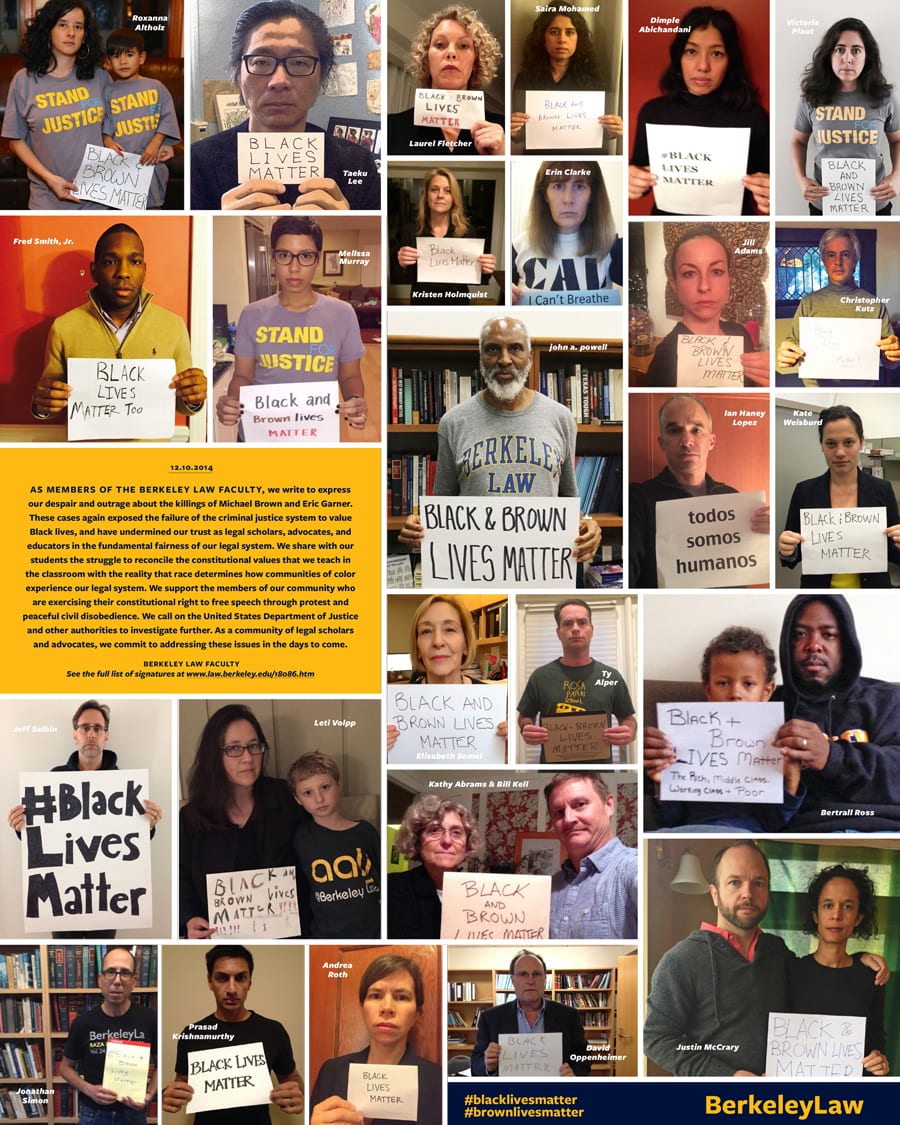
LAW 4 BLACK LIVES (10-2015)
The Henderson Center sponsored 11 Berkeley Law students to attend the #Law4BlackLives conference hosted by the Center for Constitutional Rights on July 31, 2015 in New York, NY. Students who were sponsored by the Henderson Center presented on their experiences at a lunchtime talk in the fall 2015 semester.
Law4BlackLives conference (part of “Taking Action: New Initiatives Focus on Racial Justice” article by Andrew Cohen)
Two months ago, 13 of those students joined Steinbach at the Law4BlackLives conference in New York City, a national gathering of lawyers, law students, and legal workers interested in supporting the Black Lives Matter movement. The Thelton E. Henderson Center for Social Justice provided travel and registration funding and support for students who applied.
On September 17, many of the participants shared their experiences and insights during a lunchtime talk. The students conveyed satisfaction in seeing community members and organizers at the center of the Black Lives Matter movement, and discussed ways to increase awareness of racial injustice issues at Berkeley Law.
Asad Rahim ’15 said it was “good to be in a place where the subject mattered to people personally and professionally. We didn’t have to pretend we were only interested in it as an academic matter, which is the tone you see at most conferences.”
The event “showed how important it is for lawyers to realize that they’re not the leaders of these movements,” Seema Rupani ’17 said. “We should collaborate with those involved to learn how to best support them.” For Rupani, the words of a reverend in attendance hit home. “He said we’re living in a world where stating the obvious is considered a revolutionary act.”
While unable to attend the talk, Estalyn Marquis ’16 sent a poignant comment that Steinbach read to the audience: “The conference looked closely at what kind of society we’re looking to build, not just what type of practices we’re looking to stop.”
FERGUSON & ERIC GARNER RESOURCES FROM BERKELEY LAW FACULTY AND CENTERS
In response to the recent events, our colleagues at Berkeley Law have put out these pieces:
- “Berkeley Law Faculty Statement on Michael Brown and Eric Garner Cases”
- “If We’re Having a Real Conversation About Race, Let’s Make Sure It’s the Right One” by Professor john a. powell
- “Statement by the East Bay Community Law Center in Solidarity with the #blacklivesmatter Protests in Berkeley, CA”
- “If Black Lives Matter, End the War on Crime” by Professor Jonathan Simon
- “Eric Garner, Police Brutality and the Movement to End Marginalization — How can we not only talk about, but give birth to a society where everyone belongs?” by Professor john a. powell
- “A response to Ferguson: Systemic problems require systemic solutions” by Professor john a. powell
- “The Making of Ferguson” by Richard Rothstein, Senior Fellow at Chief Justice Earl Warren Institute on Law and Social Policy
- “The Humanity of Michael Brown” by Professor Ian Haney López
- “Statement of the East Bay Community Law Center About the Killing of Michael Brown and the Protests in Ferguson”
